This report analyses the major Russian propaganda, influence and disinformation narratives present in the online space in North Macedonia in the period April-June 2023.
A total of 618 articles and 153 unique Facebook posts (non-article related/content creation) were recorded and analysed within this monitoring period. The articles were published by 94 portals and on Facebook, shared and amplified through 2.069 posts on 355 Facebook pages/groups, with a potential reach of 11.862.025 followers[1], and triggering a total of 41.248 interactions on Facebook.
Compared to the previous period, the numbers of articles, portals, interactions and potential reach have decreased, while the numbers of Facebook pages/groups and posts increased. The average ratio of interactions per post continued to decrease – from 29,8 in the previous period, to 19,9 in this one.

The narratives related to the Russian invasion on Ukraine are grouped under five general topics: (1) Events of Russia-Ukraine War (2) Economic Consequences of Sanctions, (3) Threats by Russia, (4) Military Aid to Ukraine and (5) Miscellaneous. Due to overlapping nature of the narratives within the topics, and tracking the regional context aside of the Ukraine war, an additional chapter elaborates the narratives with regional context.
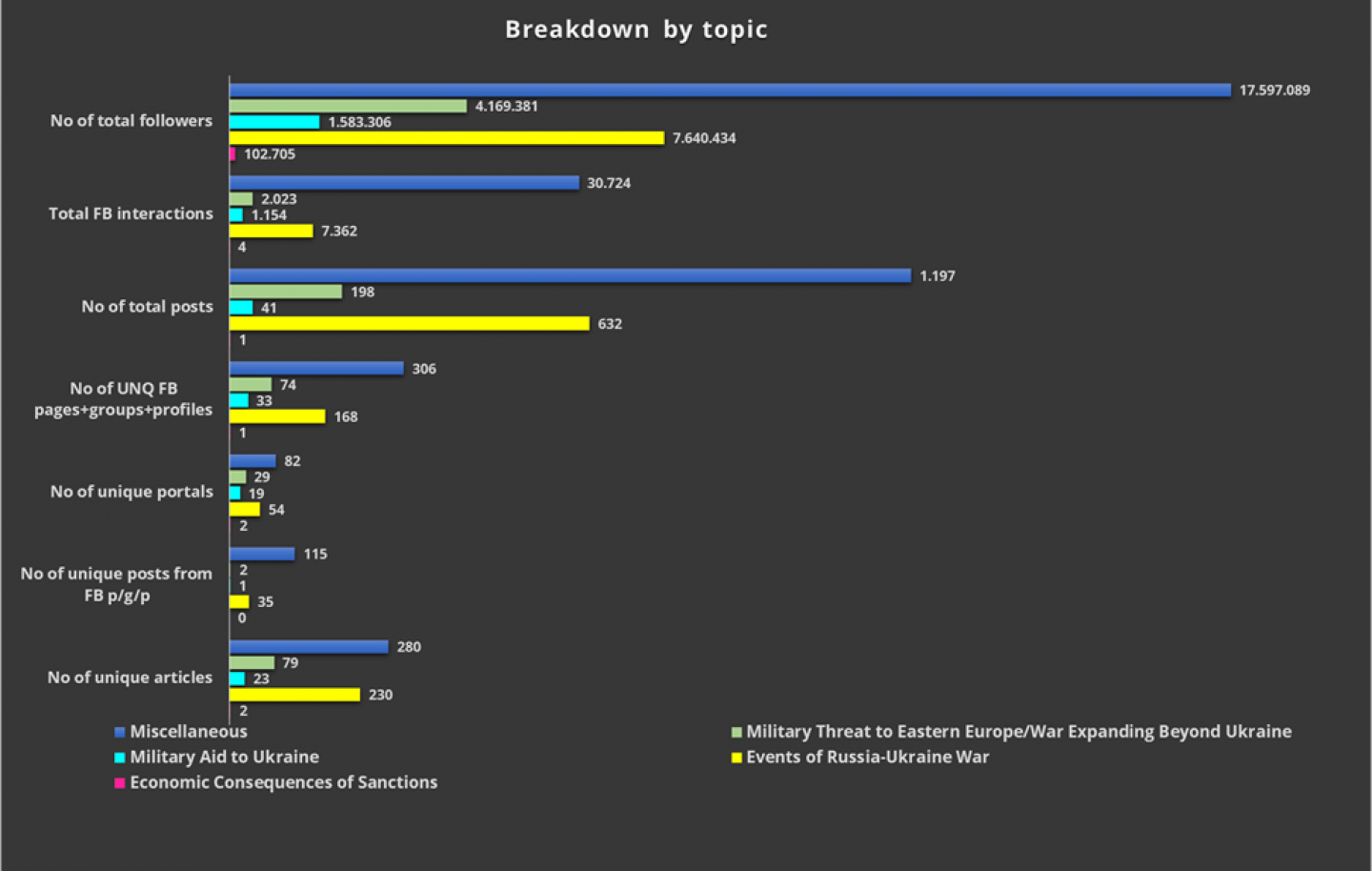
In this report the trend from the previous report in regards to the presence of the topics continued, with the topic Miscellaneous remaining dominant across all of the categories.
Within this report, the narratives were portraying picture that The West is using Ukraine to wage war against Russia, but Russia and its allies are strong and can win the war against the “evil West”. The narrative Ukrainians are Nazis continued to be promoted as an attempt to justify the aggression. Russia also continued with the (nuclear) threats, and attempts to deter the military aid to Ukraine by saying that it is a mistake. As in the previous period, the narrative Slavic and Orthodox brotherhood was the most prevalent and most engaged with during the entire period, continuing the trend that was observed in the previous months. Russian cultural and religious influence in North Macedonia was present in June, through the celebration of Russia Day.
Within the narratives with regional context, tensions in the Kosovo-Serbia relations continued to be high on the event agenda and a pretext for various statements that incited dismay across the multi-ethnic region. Serbian President Vučić relativized the war in Ukraine by portraying Ukrainian President Zelensky and Ukraine as alleged and not actual victims and made yet another attempt to bring into relation the developments in Ukraine and Kosovo with the developments in North Macedonia, despite the different contexts in the respective countries, causing dismay. In this he was joined by President of Republika Srpska Dodik, who also continued with his dangerous statements.
Events related to the Russian invasion of Ukraine
A total of 230 articles or Facebook posts were analysed within this topic. The articles were published by 54 portals and on Facebook, shared and amplified through 632 posts on 168 Facebook pages/groups, reaching 7.640.434 followers and triggering a total of 7.363 interactions on Facebook.
Within this topic, there were three narratives that were the most dominant for the period: (1) The West is using Ukraine to wage war against Russia, (2) Russia and its allies are strong and (3) Ukrainians are Nazis.
The narrative The West is using Ukraine to wage war against Russia was present in May and June, it had the highest number of interactions within this topic (1.600) and was second according to the number of Facebook posts (88). It was promoted through the speech of the Russian President Putin on the Red Square parade on 9 May and through an interview of the Director of the Russian Foreign Intelligence Service Sergey Naryshkin. Putin sent the message that “the West is waging war against Russia,” which represents an effort to distort the reality and whitewash the disrespect of the international law and norms and the more important fact that Russia conducted an unprovoked and unjustified aggression on Ukraine. Naryshkin recycled this narrative and blamed Ukraine for devising a “dirty bomb”.
Director of the Russian Foreign Intelligence Service Sergey Naryshkin at a meeting with Putin in Kremlin in 2012 while he had the position of Speaker of the Russian Duma. - source: pravda.com.ua
Threats towards the UK were issued by Medvedev, who, commenting on the statement of British FM James Cleverley that Ukraine has the right to attack targets on Russian territory for self-defense, said that British "stupid officials" should remember that Britain can be "qualified as if it were at war".
Military Aid to Ukraine
A total of 27 articles or Facebook posts were analysed. The articles were published by 19 portals and on Facebook, shared and amplified through 41 posts on 33 Facebook pages/groups, reaching 1.583.306 followers and triggering a total of 1.154 interactions on Facebook.
The dominant narrative within this topic was Military aid to Ukraine is a mistake. It was present in April, through the reaction of Russian MFA spokeswoman Zakharova to the decision of the Government of North Macedonia to donate the helicopters to Ukraine, saying that the decision was a huge mistake. The decision was also commented by pro-Russian voice who derogatory named the MoD of North Macedonia Napoleonka [female version of Napoleon].
Miscellaneous
A total of 280 articles or Facebook posts were analysed. The articles were published by 82 portals and on Facebook, shared and amplified through 1.197 posts on 306 Facebook pages/groups, reaching 9.697.149 followers and triggering a total of 30.704 interactions on Facebook.
The most dominant narratives within this topic were related to Russia: (1) Slavic and Orthodox brotherhood and (2) Russian cultural and religious influence in North Macedonia.
As in the previous period, the narrative Slavic and Orthodox brotherhood was the most prevalent and most engaged with during the entire period, and it was throughout entire monitoring period. In April, it was promoted through the statement of Metropolitan Pavel of the Kiev-Pechersk Lavra regarding the expelling of the priests from this monastery, as well as by the expression of support by Serbian Patriarch Porfirije. As a part of marking 9 May, the Archimandrite Vassian (Zmeev) from Sofia, Bulgaria, held a joint memorial service in Skopje for “the Russians who died for the faith and the Fatherland at all times”, together with clergy from the MOC–OA. Being aware of the role of the Russian Orthodox Church in the ongoing unprovoked and unjustified Russian aggression of Ukraine, as well as of the fact that it is controlled by the Kremlin, the joint memorial makes the MOC-OA a supporter of the “Russian cause”. This represents one of the tools of Russian ‘sharp power’ in North Macedonia, which has been elaborated in detail in the FN study “The immortal regiment as Kremlin’s piercer of sharp power in North Macedonia on Victory Day”.
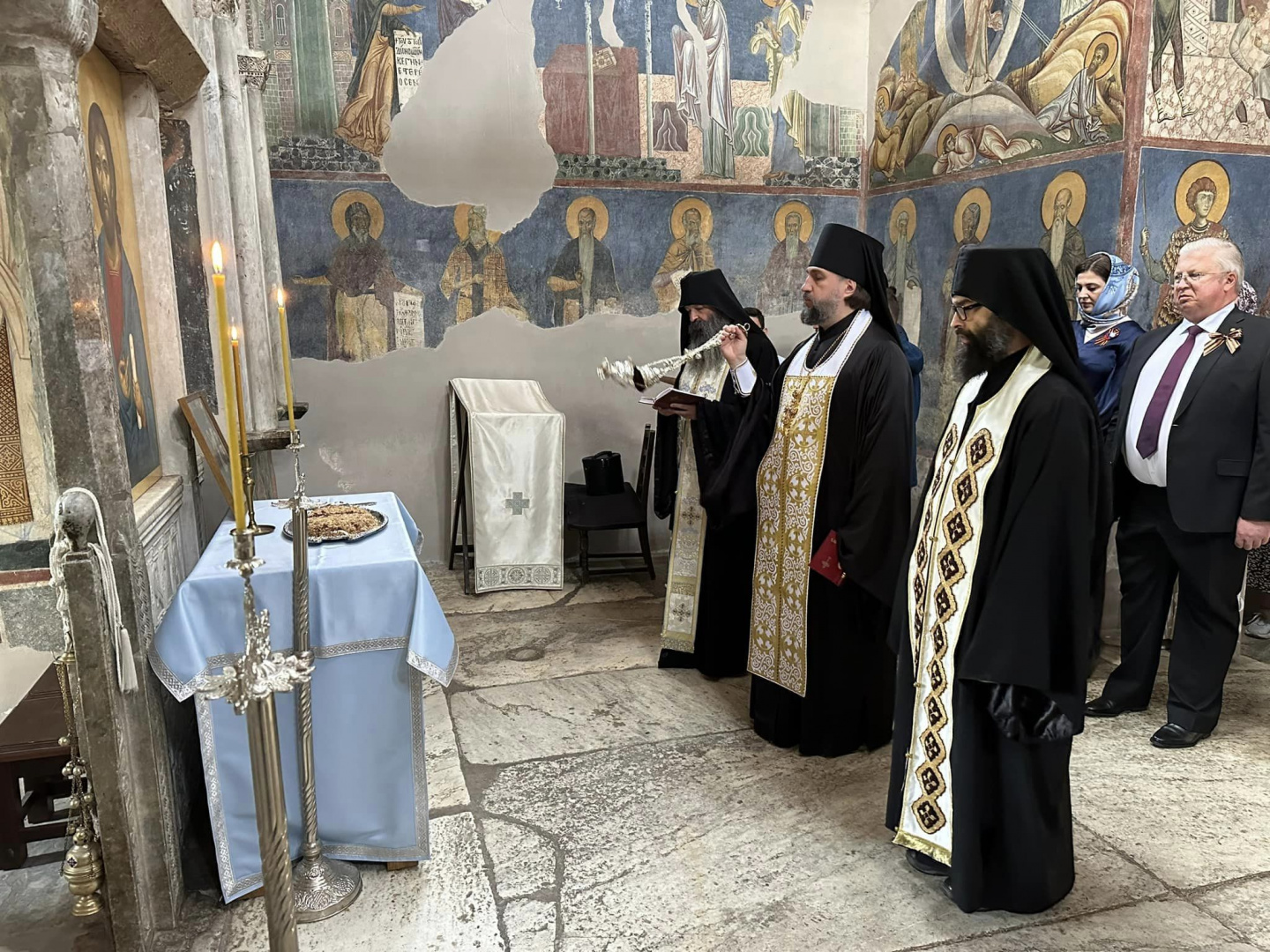
Archimandrite Vasian Zmeev (in the middle) in the St. Panteleimon church - Skopje, 8 May, 2023
The other event which was also the case with the highest number of interactions within this report was the joint religious service of the Patriarch of the Serbian Orthodox Church (SOC) Porfirije and the Archbishop of the Macedonian Orthodox Church – Ohrid Archbishopric (MOC-OA) Stefan, on the occasion of “one year of granting the tomos for autocephality from SOC to MOC-OA”. The coverage carried the message of unification, love and understanding, thus presenting a distortion that the tomos from the SOC is the ultimate and the most important achievement. In fact, the Ecumenical Patriarchate is the solemn entity which upholds and observes the canonical rules for granting autocephality.
Russian cultural and religious influence in North Macedonia was present in June, through the celebration of Russia Day. The reception on the occasion of the holiday was attended by Metropolitans Petar and Grigorij from the MOC-OA. The pro-Russian far-right party Rodina also promoted and had representatives at the event. The speech of Ambassador Bazdnikin was in line with the Russian propaganda, sending messages that “Russia is fighting against the collective West”, against the “world policeman and the hegemon”, followed by promotion of the Slavic-Orthodox brotherhood through the statement “…last year the Russian Orthodox Church – to full extent recognized the autocephality of the Macedonian Orthodox Church – Ohrid Archbishopric”.
Narratives with regional context
Narratives with regional context were present throughout the entire monitoring period. As in the previous period, tensions in the Kosovo-Serbia relations continued to be high on the event agenda and a pretext for various statements that incited dismay across the multi-ethnic region. In April, Serbian President Vučić said that Pristina's only goal was to provoke the Serbs and present themselves as another "Zelensky", and drag Serbia into a conflict with NATO, thus relativizing the war in Ukraine by portraying Ukrainian President Zelensky and Ukraine as alleged and not actual victims.
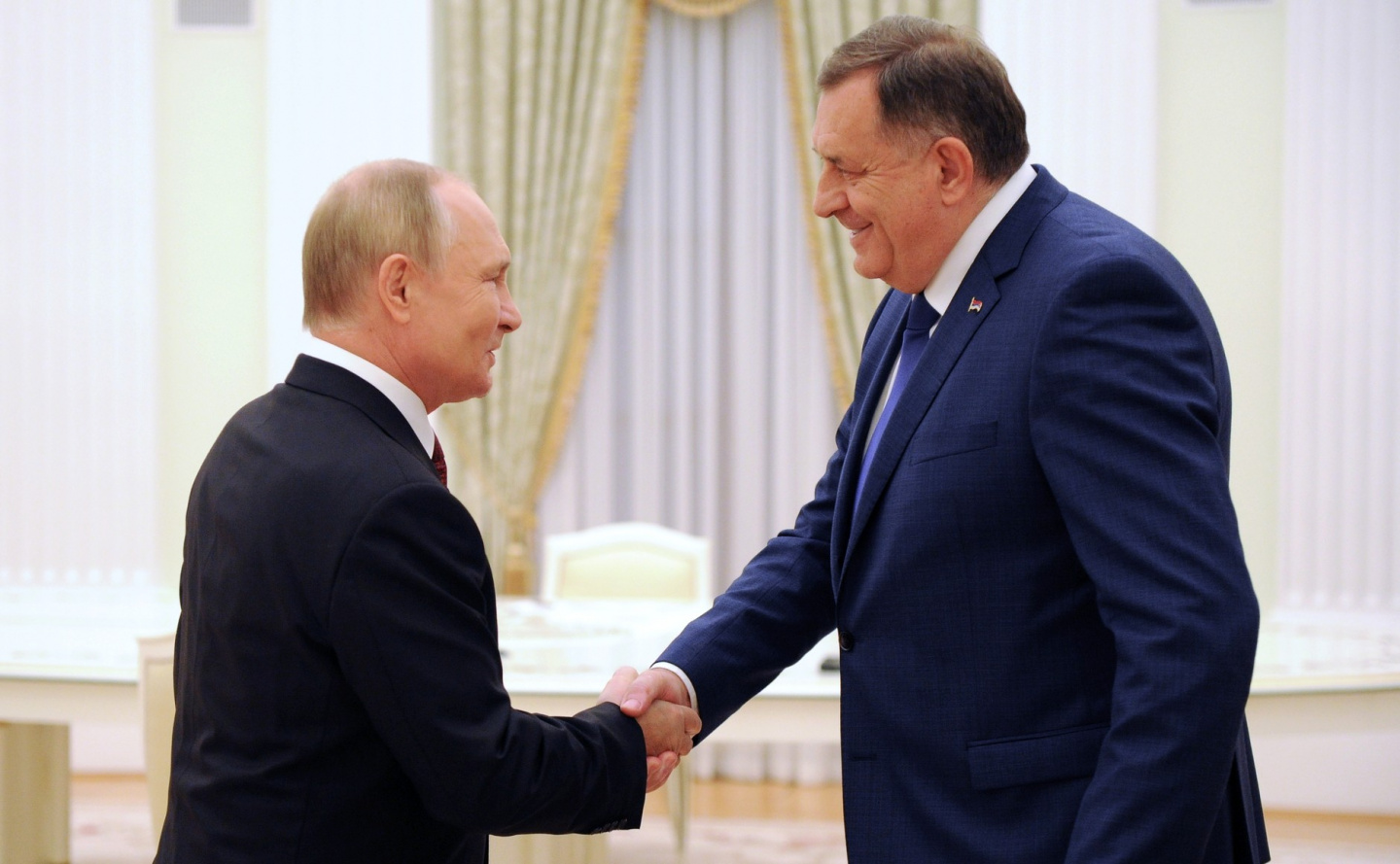
Milorad Dodik and Putin in 2010, source: Wikipedia
In May, President of Republika Srpska Dodik continued with his dangerous and irresponsible statements about the independence of Republika Srpska, adding to this the unification of all Serbs, thus causing dismay across the multi-ethnic region and in North Macedonia as well.
In June, Vučić was present again with his statement that a "hybrid war" was being waged against Serbia through the Kosovo Serbs and their leaders who were accused of criminal acts, and that according to the West, "Serbia must be guilty”. He mentioned the conflict in 2001 in North Macedonia, drawing a parallel with the events in Serbia and he also said that the West requested an amnesty for the National Liberation Army members.
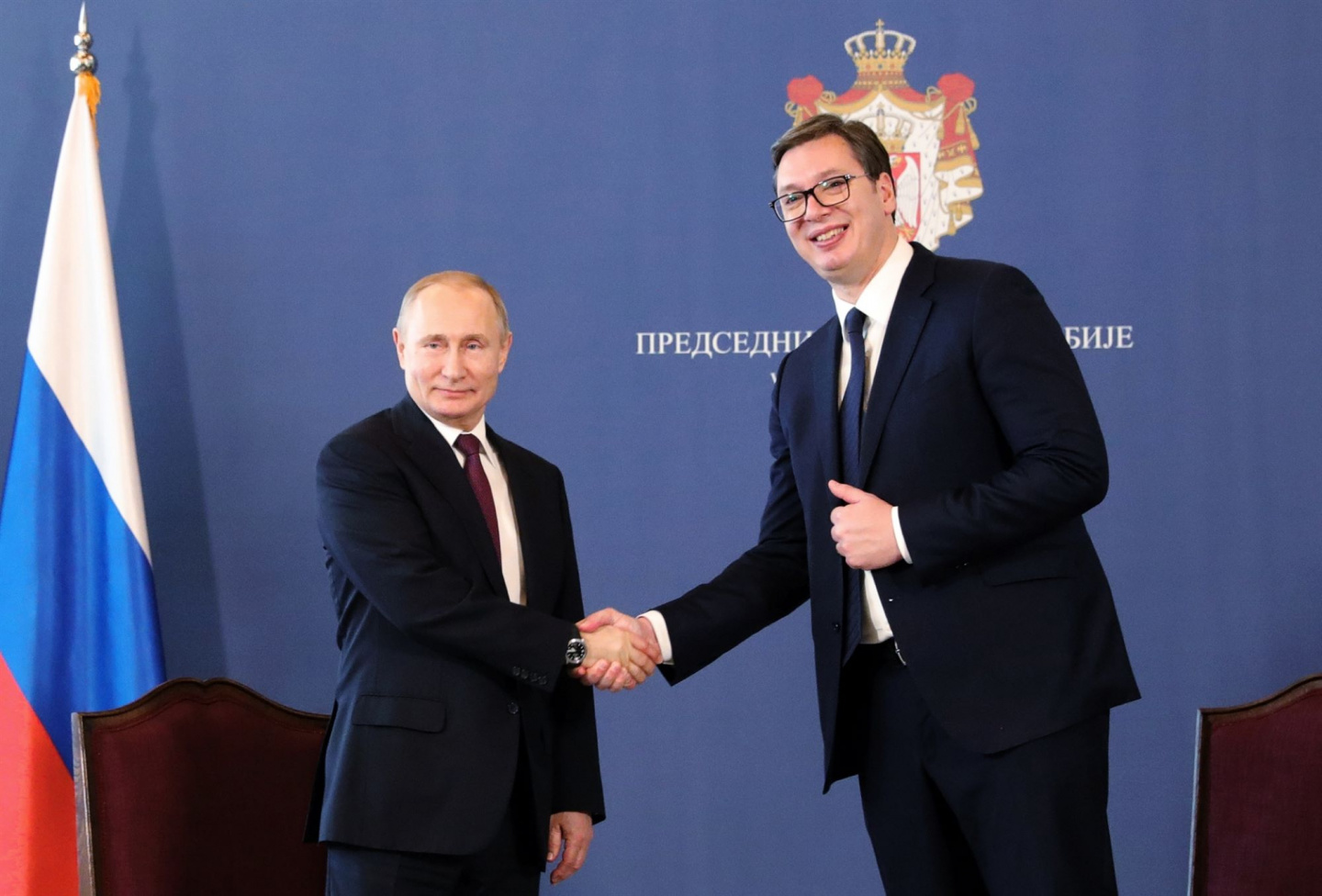
Vucic and Putin in Belgrade during Putin's official visit in 2019 . Source: Vucic.rs
This is yet another attempt to bring into relation the developments in Ukraine and Kosovo with the developments in North Macedonia, despite the different contexts in the respective countries. Additionally, bringing into relation the ethnic conflict from 2001 with the Kosovo issue is a very irresponsible course of action, which causes dismay and may result in escalation of the situation.
Statistics
Top 5 stories by number of articles, reach and interactions

Top 10 websites by number of articles and top 10 Facebook pages/groups by number of posts (articles)
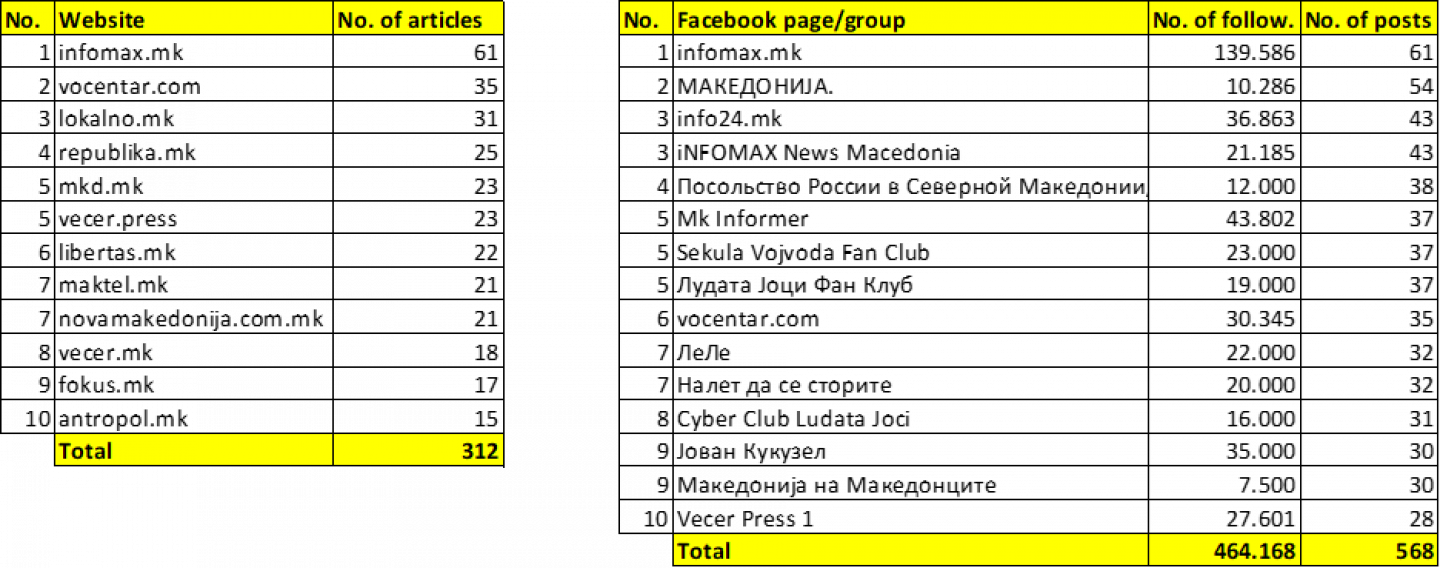
The top 12 websites according to the number of articles or 12,8% of the total number of websites, published just over half of the total number of articles (312 out of 618 articles).
The top 15 Facebook pages/groups according to the number of posts or 4,2% of the total number of Facebook pages/groups) posted 27,4% of the total number of posts [568 out of 2.069 posts (articles)].



